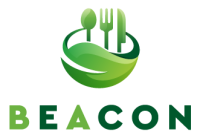OUR GOALS

The BEACON project seeks to answer two interrelated research questions. One with a focus on the individual and specific target behaviours (meat consumption and food waste), and one with a focus on the context of the larger urban food system and design processes.
→ How to move consumer-citizens towards “peak meat” and reduce avoidable food waste?
→ How to design a more resilient food system and food environment?
bY FINDING THE ANSWERS TO THESE QUESTIONS,
OUR AMBITIONS ARE:
Our research aims to explore and test behavioural changes towards lifestyle patterns that help societies stay within the safe and just consumption and production corridors, thus supporting consumers, businesses, governments and civil society groups to reach sustainable and resilient lifestyles by avoiding, shifting, and improving food-related behaviour, specifically reducing meat consumption and avoidable household food waste.
Circular thinking and action are at the core of the emerging economic model of a circular economy (CE) that mimics the cyclical and cascading use of products and materials of ecosystems. First appearing in the literature in the early nineties, the CE has gained traction among researchers, policymakers, and businesses alike, with its potential to reach the needed scale of decarbonisation, defossilisation, dematerialization, and renaturalisation. As a part of this movement, the BEACON project aims to further develop and define the concept of circular society, investigate supportive incentives and disincentives for citizens and consumers to engage in social innovations fostering the circular society, including drivers and barriers within the market, regulatory, and institutional contexts.
Humans can be major drivers of change. Yet, a focus on technological solutions dims the social side of circularity and assigns it to a supporting role. Yet, even the fanciest material, technological, and regulatory innovations will thrive only when the behavioural factor is built into their design. Beyond changing economic incentives and disincentives, the behavioural approach means making it easy and rewarding for people to make the (in their view) right choice, to detect and then to remove barriers for change (“sludges”). Thus, we aim to investigate behavioural drivers and barriers to change and to suggest effective behaviourally enlightened policy tools. Going beyond existing knowledge, we focus on the psychographic and sociodemographic characteristics of the targeted individuals as regards cost-effectiveness and acceptability of green food nudges. Employing recent work of policy implementation and evaluation, we want to find out what works best for whom and who benefits most from such policies.
Food systems define access, availability, and affordability of more sustainable options for consumers. In light of the climate crisis, it is a collective duty and political task to shape the system of provision and to create pathways to change. To start with, regulators, city administrators, and entrepreneurs must understand what consumers want and where the limits are. We will hence engage all relevant stakeholders in a constructive, structured and human-centered dialogue to co-create and test innovative prototype solutions to change towards a sustainable urban food system.
